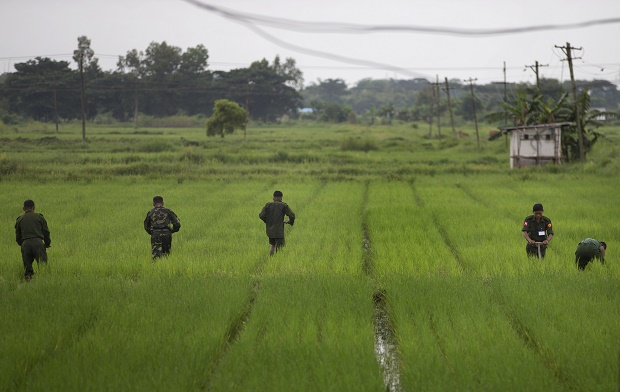The border region has been emptied of most of its Muslim residents since late August, when Myanmar's military launched a crackdown on Rohingya muslims that the UN has described as "textbook" ethnic cleansing.
Hundreds of villages have been burned to the ground, with more than 600,000 Rohingya fleeing across the border for sanctuary in Bangladesh.
Under intense global pressure, Myanmar has agreed to repatriate "scrutinised" refugees who can prove their residence in Rakhine.
But details of the plan remain sketchy, seeding concern about who will be allowed back, what they will return to and how they will live in a region where anti-Rohingya hatred remains sky-high.
On Saturday the government began harvesting 71,000 acres of rice paddy in Maungdaw -- the Rohingya-majority area hit hardest by the violence -- according to state media and a local official.
"We started harvesting today in Myo Thu Gyi village tract," Thein Wai, the head of Maungdaw's Agricultural Department, told AFP.
"We are going to harvest some paddy fields of Bengalis who fled to Bangladesh," he said, using a pejorative term for the Rohingya commonly used by officials and the Buddhist public.
The official said he did not know what government would do with the rice or its proceeds.
Workers were bused in from other parts of the country to assist with the harvest, according to the state-run Global New Light of Myanmar.
Rights groups blasted the government's harvest as part of a systematic effort to expunge the Rohingya from Rakhine.
"Government officials leading the harvest are clearly more concerned about these fields of abandoned rice than they ever were about the Rohingya people who sowed it," said Human Rights Watch's Phil Robertson.
"This all reinforces a singular, local level Rakhine message to the Rohingya refugees in Bangladesh that what's yours is now mine, and you're not welcome back."
Fortify Rights said the harvest was an "outrageous" move by authorities who have a long history of land grabs, particularly in ethnic minority frontiers.
Myanmar has denied charges of ethnic cleansing and defended its military campaign.
But media, rights groups and the UN have documented consistent accounts from Rohingya refugees of atrocities at the hands of Myanmar security officers, who are accused of killing civilians, raping women and torching homes.
On Friday UN rights experts said they were "deeply disturbed" after speaking to refugees in Bangladesh.
The accounts they heard "point to a consistent, methodical pattern of actions resulting in gross human rights violations affecting hundreds of thousands of people," said Marzuki Darusman, who chairs the fact-finding mission.
Myanmar refuses to recognise the Rohingya as a distinct minority, rendering the 1.1-million strong group stateless.
The army has spread the view that they are foreign "Bengalis" from Bangladesh, despite many having lived in Myanmar for generations.
/257
source : AFP
Saturday
28 October 2017
1:13:25 PM
863067

(AhlulBayt News Agency) - Myanmar's government began harvesting rice from farmland abandoned by Rohingya in northern Rakhine on Saturday, officials said, a move likely to raise concerns about the prospect of return for more than half a million refugees who have fled communal violence in the area.
